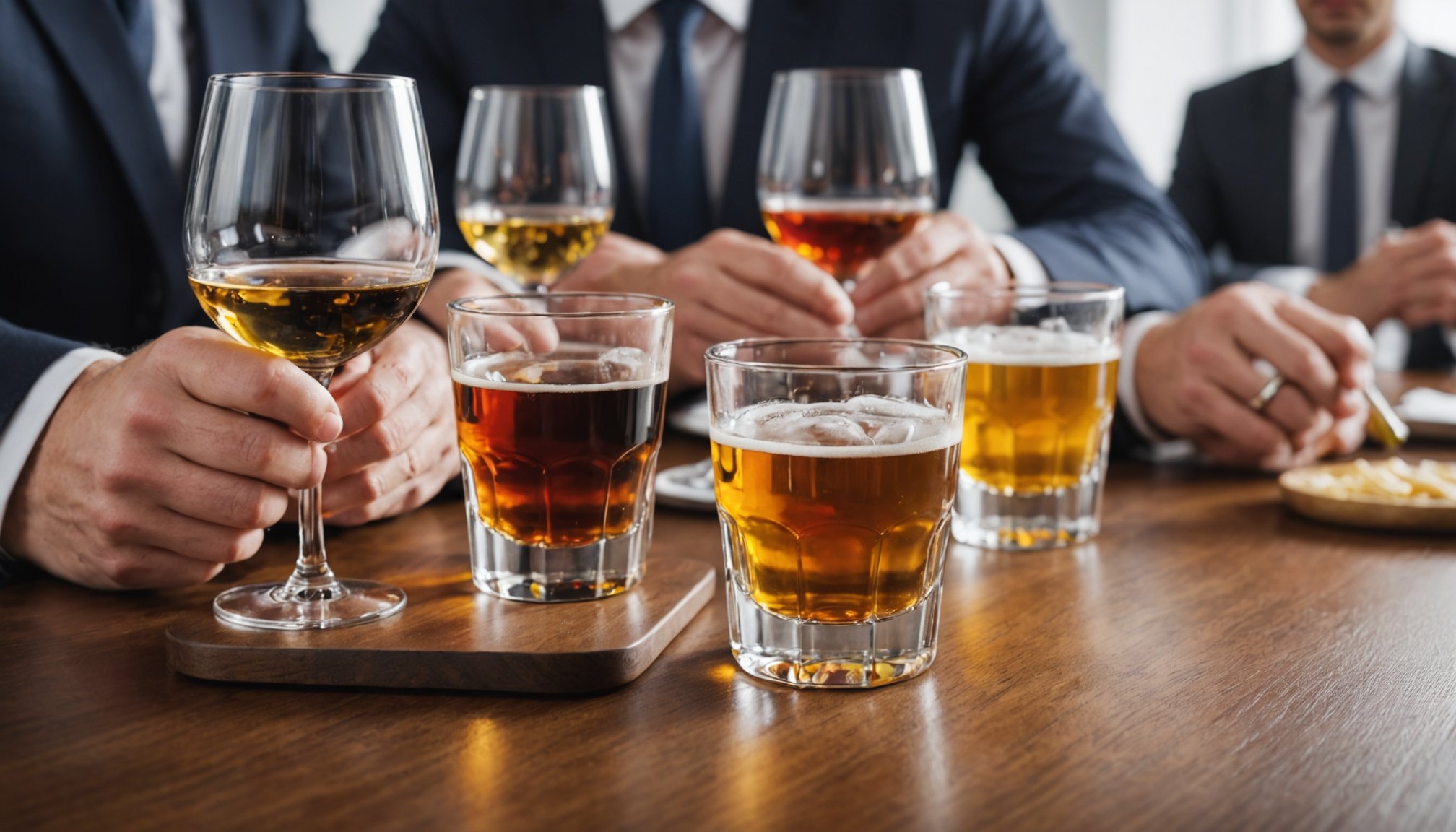Your Roadmap to Success: Key Steps for UK Businesses to Obtain an Alcohol Licence
Starting a business in the UK, especially in the hospitality industry, can be an exciting but daunting task. If you plan to open a restaurant, bar, or any establishment that serves alcohol, obtaining the right licence is crucial. Here’s a comprehensive guide to help you navigate the process and ensure your business is set up for success.
Understanding the Types of Alcohol Licences
Before diving into the application process, it’s essential to understand the different types of alcohol licences available in the UK.
Also read : Navigating the equality act 2010: critical legal responsibilities every uk business must know
Premises Licence
A Premises Licence is required for any business that intends to sell alcohol, provide regulated entertainment, or serve late-night refreshment. This licence is issued by the local licensing authority and is specific to the premises where the activities will take place.
Personal Licence
A Personal Licence is required for individuals who will be responsible for the sale of alcohol. This licence is also issued by the local licensing authority and is a requirement for anyone who will be designated as the premises supervisor.
Also read : Key data protection act 2018 compliance requirements every uk business must know
Preparing Your Business Plan
A well-structured business plan is the foundation of any successful business. Here are some key elements to include when planning to open a restaurant or bar that sells alcohol:
Market Research
Conduct thorough market research to understand your target market. This includes identifying your customer demographics, their preferences, and the competition in your area.
- Identify your target market: Who are your customers? What are their preferences?
- Analyze the competition: What are other businesses in the area offering?
- Determine market trends: What is currently popular in the industry?
Financial Projections
Create detailed financial projections, including startup costs, ongoing expenses, and revenue projections. This will help you secure funding and ensure your business is financially viable.
- Startup costs: Licence fees, premises rental/purchase, equipment, staffing
- Ongoing expenses: Stock, utilities, marketing, staff salaries
- Revenue projections: Sales forecasts, pricing strategy
Marketing Strategy
Develop a marketing strategy to attract and retain customers. This can include online marketing, social media, and local advertising.
- Online presence: Create a website and engage on social media
- Local advertising: Use local newspapers, flyers, and community events
- Customer loyalty programs: Offer discounts, loyalty cards, and exclusive deals
Applying for a Premises Licence
To apply for a Premises Licence, you need to follow these steps:
Step 1: Choose the Right Licence
Determine which type of licence you need based on your business activities. For selling alcohol, you will typically need a Premises Licence.
Step 2: Prepare the Application
Gather all necessary documents and information. This includes:
- Application form: Available from your local licensing authority
- Fee payment: The fee varies depending on the rateable value of your premises
- Plans of the premises: Detailed floor plans showing the layout and any proposed changes
- Operating schedule: Details of the hours you intend to operate and any other activities
- Consent from the designated premises supervisor: If you have a Personal Licence holder
Step 3: Submit the Application
Submit your application to the local licensing authority. You must also advertise your application in a local newspaper and display a notice at the premises.
- Newspaper advertisement: Must be published within 10 working days of submitting the application
- Premises notice: Must be displayed for 28 consecutive days
Step 4: Consultations and Representations
The local licensing authority will consult with various bodies, including the police, fire authority, and health and safety officers. During this period, any interested parties can make representations.
- Consultation period: Typically 28 days
- Representations: Can be made by anyone, including local residents and businesses
Obtaining a Personal Licence
To obtain a Personal Licence, you need to meet the following criteria:
Step 1: Meet the Eligibility Criteria
You must be at least 18 years old and not have any relevant convictions.
Step 2: Complete the Training
You need to complete a Level 2 Award for Personal Licence Holders course, which covers the legal and social responsibilities of selling alcohol.
Step 3: Submit the Application
Apply to the local licensing authority with the required documents, including:
- Application form
- Fee payment
- Proof of identity and address
- Proof of having completed the training course
- Disclosure and Barring Service (DBS) check
Ensuring Health and Safety Compliance
Health and safety compliance is crucial for any business, especially those serving food and alcohol.
Risk Assessment
Conduct a thorough risk assessment to identify potential hazards and implement measures to mitigate them.
- Identify hazards: Slip, trip, and fall risks, food safety risks, etc.
- Implement controls: Training staff, using safety equipment, maintaining clean premises
Food Safety
Ensure your business complies with food safety regulations. This includes proper food handling, storage, and preparation practices.
- Training staff: Ensure all staff are trained in food safety practices
- Regular inspections: Conduct regular inspections to ensure compliance
- Record keeping: Keep detailed records of food safety practices and inspections
Marketing Your Business
Once you have your licences and are ready to open, it’s time to attract customers.
Online Presence
Create a strong online presence through your website and social media channels.
- Website: Include menus, opening hours, contact details, and online booking options
- Social media: Engage with customers, share updates, and promote special offers
Local Marketing
Use local marketing strategies to attract customers from your immediate area.
- Local events: Participate in or sponsor local events to raise awareness
- Partnerships: Partner with local businesses to offer joint promotions
- Loyalty programs: Implement loyalty programs to retain customers
Example of a Successful Business
Let’s take the example of a new bar in a bustling city center. Here’s how they might apply the steps outlined above:
Market Research
The bar owners conducted market research to identify a gap in the market for a craft beer bar. They found that there was a high demand for unique beer options and a lack of bars catering to this demographic.
Business Plan
They created a detailed business plan, including financial projections, a marketing strategy, and operational plans. They secured funding through a combination of loans and investors.
Licence Application
They applied for a Premises Licence and ensured that one of the owners had a Personal Licence. They submitted the application, advertised in the local newspaper, and displayed the notice at the premises.
Health and Safety
They conducted a thorough risk assessment and implemented measures to ensure health and safety compliance. They trained their staff in food safety practices and maintained detailed records.
Marketing
They created a strong online presence through their website and social media channels. They participated in local events, partnered with nearby businesses, and implemented a loyalty program to retain customers.
Practical Insights and Actionable Advice
Here are some practical insights and actionable advice to help you on your journey:
Ensure Your Premises Are Ready
Make sure your premises are fully prepared before applying for the licence. This includes any necessary renovations and ensuring that all health and safety measures are in place.
Engage with Your Community
Engage with your local community through events and partnerships. This can help build a loyal customer base and improve your reputation.
Stay Up-to-Date with Regulations
Stay informed about any changes in licensing regulations and ensure your business complies with all requirements.
Invest in Staff Training
Invest in training your staff to ensure they are knowledgeable about the products you sell and can provide excellent customer service.
Obtaining an alcohol licence in the UK is a complex process, but with the right guidance, it can be navigated successfully. Here is a summary of the key steps:
| Step | Description |
|---|---|
| Market Research | Identify your target market and understand their preferences |
| Business Plan | Create a detailed business plan including financial projections and marketing strategy |
| Premises Licence | Apply for a Premises Licence and ensure compliance with all requirements |
| Personal Licence | Obtain a Personal Licence for the designated premises supervisor |
| Health and Safety | Ensure health and safety compliance through risk assessments and training |
| Marketing | Create a strong online presence and engage in local marketing strategies |
By following these steps and ensuring your business is well-prepared, you can set yourself up for success in the competitive UK hospitality industry.
Quotes from Industry Experts
- “The key to success in the hospitality industry is understanding your market and providing a unique offering that meets their needs.” – John Smith, Owner of The Craft Beer Bar
- “Ensuring health and safety compliance is not just a legal requirement, it’s also crucial for building customer trust and loyalty.” – Jane Doe, Health and Safety Consultant
- “A strong online presence is essential for attracting and retaining customers in today’s digital age.” – Bob Johnson, Marketing Specialist
By taking the time to understand the licensing process, preparing a solid business plan, and ensuring compliance with all regulations, you can build a successful business that thrives in the UK market. Remember, your business plan is your roadmap to success, and with the right licences and strategies in place, you can make sure your restaurant, bar, or any alcohol-serving establishment stands out and attracts a loyal customer base.











